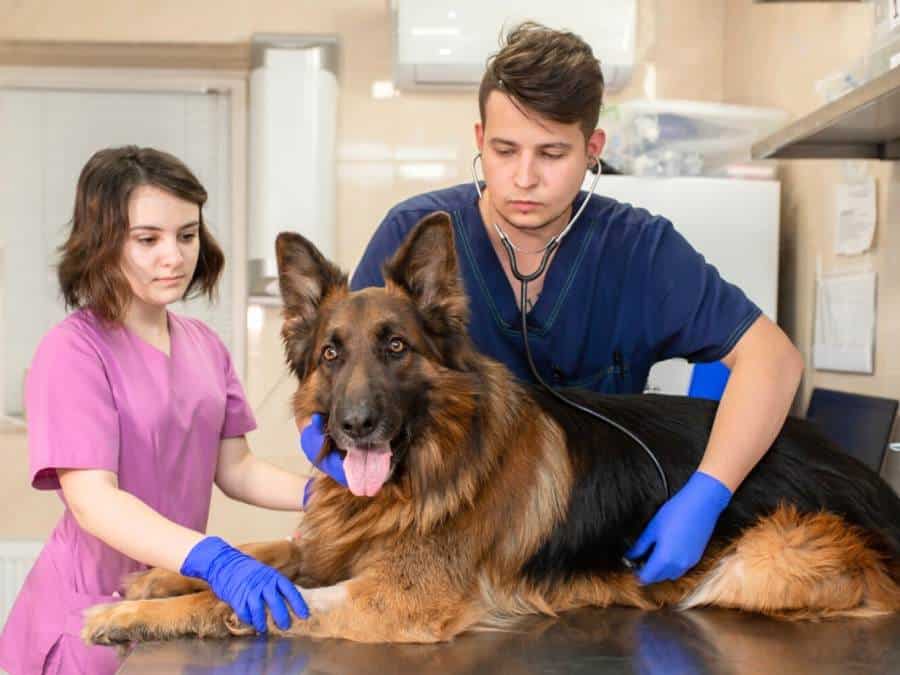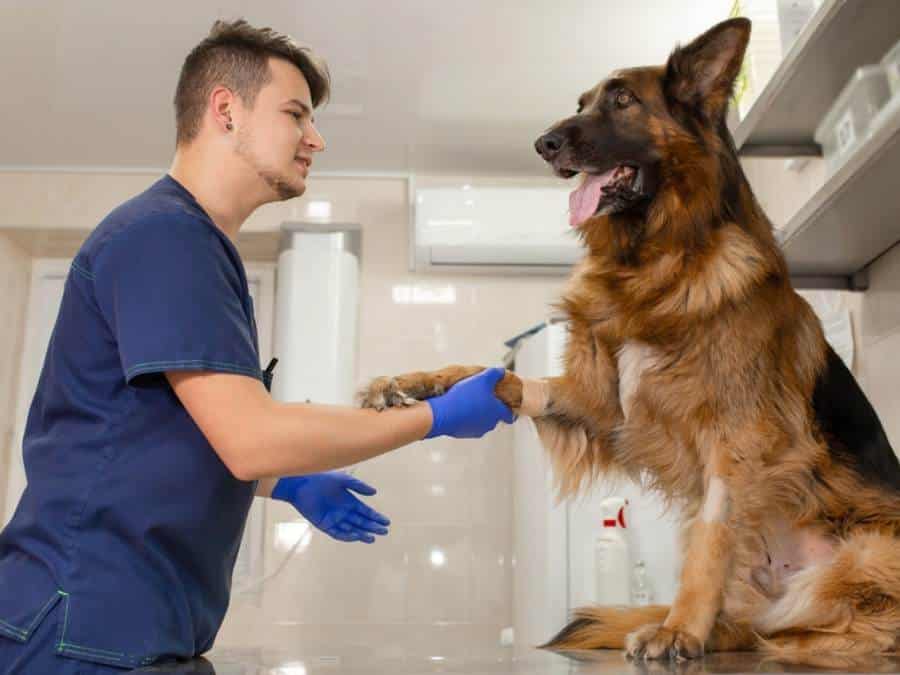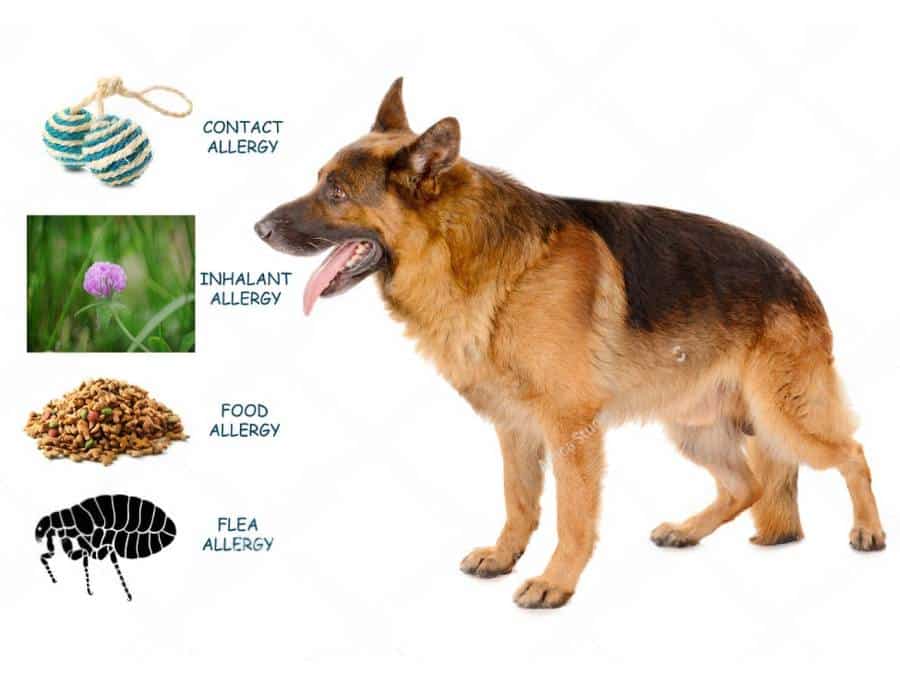German Shepherds are known to be prone to various health issues, which can impact their overall well-being. As a devoted owner of three magnificent German Shepherds over the past 21 years, I’ve researched and learned a lot about the common health issues faced by GSDs.
In this blog, I’ll share what I’ve picked up over the years to help fellow German Shepherd owners understand and tackle these issues. By being informed, you can ensure that your German Shepherd lives a long, healthy, and fulfilling life.
Common German Shepherd Health Issues
Here is a list of the most common health problems in German Shepherds:
1. Joint and Bone Health Issues
- Hip Dysplasia
- Elbow Dysplasia
- Degenerative Disc Disease
- Panosteitis
2. Digestive and Metabolic Health Issues
- Bloat
- Diabetes
- Pancreatitis
- Exocrine Pancreatic Insufficiency (EPI)
3. Blood Disorders
- Hemophilia
- Von Willebrand Disease
4. Eye Conditions
- Cataracts
- Pannus
5. Other Health Concerns
- Epilepsy
- Degenerative Myelopathy
- Allergies
- Thyroid Issues
- Bladder Stones
- Cancer
Now let’s briefly discuss the symptoms and treatment options for each of these German Shepherd health issues.
Joint & Bone Health Issues
1. Hip Dysplasia
Hip dysplasia, a hereditary condition affecting 15%-20% of German Shepherds, involves abnormal hip joint development, leading to pain, inflammation, and arthritis.

It’s primarily genetic, but environmental factors like rapid growth, obesity, and poor nutrition can exacerbate it.
Symptoms vary, including decreased activity, limping, stiffness, a narrow stance, and muscle loss in the hindquarters. Diagnosis is through physical exams and X-rays, which help grade its severity.
Treatment ranges from weight and exercise management, medications, and physical therapy, to surgery in severe cases.
2. Elbow Dysplasia
Elbow dysplasia is an orthopedic issue in dogs, especially German Shepherds, marked by improper elbow joint development, leading to pain and lameness.

It’s largely genetic but can be exacerbated by rapid growth, poor nutrition, excessive exercise, and obesity.
Symptoms include lameness, pain, joint swelling, and decreased range of motion. Diagnosis involves physical exams and imaging, like X-rays.
Treatment varies from medical management and weight management to physical therapy and, in severe cases, surgery.
3. Degenerative Disc Disease
Degenerative Disc Disease (DDD) in German Shepherds is the progressive deterioration of the spine’s intervertebral discs, leading to pain, instability, and possible neurological issues.

It’s linked to aging, genetics, repetitive stress, or trauma, with specific injuries potentially hastening the process.
Symptoms include back pain, reluctance to move, altered gait, difficulty in rising or jumping, and neurological issues like weakness or loss of coordination.
Diagnosis involves a physical and neurological exam, and imaging tests like X-rays or MRI to assess disc condition.
Treatment ranges from medical management with rest and medications to surgical intervention for severe cases or neurological symptoms.
4. Panosteitis
Panosteitis (“pano” or “long bone disease”) is an inflammatory condition affecting the long bones of young, rapidly growing German Shepherds and other large breeds, causing pain and lameness.
Typically seen between 5 and 18 months of age, it aligns with their rapid growth period and generally resolves as the dog matures.
Symptoms include sudden lameness, often in the front limbs, with pain that may “wander” between limbs, and reluctance to bear weight.
Diagnosis is through physical exams and X-rays showing bone changes.
Treatment focuses on pain management, using medications and rest, and is generally self-limiting, resolving with age.
Digestive and Metabolic Health Issues
1. Gastric Dilatation and Volvulus (GDV) or Bloat
Gastric Dilatation and Volvulus (GDV), or bloat, is a critical condition affecting German Shepherds and similar large, deep-chested breeds.
It occurs when the stomach rapidly fills with gas and fluid, then twists, obstructing normal function.

Risk factors include the breed’s anatomy, age (more common in middle-aged to older dogs), dietary habits (such as eating quickly or one large meal daily), and genetics.
Symptoms, signaling a medical emergency, include a distended abdomen, unsuccessful vomiting attempts, restlessness, excessive salivation, rapid breathing, and potential collapse.
Diagnosis is through clinical signs and imaging. Immediate treatment involves stabilization, stomach decompression, and possibly emergency surgery.
Preventative measures include feeding multiple small meals, using slow-feeder bowls, and avoiding exercise right after eating to reduce GDV risk.
2. Pancreatitis
Pancreatitis is an inflammation of the pancreas, crucial for digestion and blood sugar regulation, and can occur in any dog breed, including German Shepherds.
It’s not particularly common in German Shepherds, but they can develop it due to high-fat diets, sudden dietary changes, obesity, or genetics.
Symptoms range from abdominal pain, vomiting, and diarrhea to loss of appetite, lethargy, fever, and dehydration.
Diagnosis is through physical exams, blood tests for pancreatic enzymes, and imaging like ultrasound.
Treatment may require hospitalization for severe cases, with supportive care like IV fluids. Dietary management involves a low-fat, digestible diet, and medications may be used for pain and nausea control.
3. Exocrine Pancreatic Insufficiency (EPI)
Exocrine Pancreatic Insufficiency (EPI) is a condition where the pancreas fails to produce enough digestive enzymes, leading to nutrient malabsorption and malnutrition.

It’s particularly noted in German Shepherds due to pancreatic acinar atrophy, an immune-mediated cell destruction, though chronic pancreatitis, genetic factors, and certain medications can also contribute.
Symptoms include weight loss despite good appetite, foul-smelling diarrhea, gas, poor coat condition, hunger, and muscle wasting.
Diagnosis is through clinical signs, blood tests for enzyme levels (trypsin-like immunoreactivity), and fecal fat content tests.
Treatment focuses on Enzyme Replacement Therapy (ERT) by adding enzyme supplements to meals, ensuring a balanced diet, and possibly additional vitamin and mineral supplements for overall health support.
4. Diabetes
Diabetes mellitus is a metabolic disorder affecting German Shepherds and other dog breeds, characterized by the body’s failure to regulate blood glucose levels due to inadequate insulin production or insulin response.
It primarily manifests as Type 1 diabetes, where insulin is insufficiently produced, more commonly in German Shepherds, and Type 2 diabetes, where the body fails to respond to insulin properly.
Symptoms to watch for include increased thirst, frequent urination, heightened hunger, weight loss, lethargy, and vision changes.
Diagnosis by a veterinarian includes blood tests for glucose levels and a fructosamine test to gauge average blood glucose over several weeks.
Treatment mainly involves insulin therapy, tailored to the dog’s specific needs.
Diabetes prevention focuses on a healthy lifestyle, including a proper diet, regular exercise, and weight management to mitigate diabetes risk.
Blood Disorders
1. Hemophilia
Hemophilia in German Shepherds (GSDs) involves a genetic clotting disorder, notably impairing blood clotting and causing prolonged bleeding.
It comes in two types: Hemophilia A (factor VIII deficiency) and Hemophilia B (factor IX deficiency), with Hemophilia A being more common in GSDs.
Symptoms include prolonged bleeding from minor injuries or surgeries, easy bruising, joint swelling leading to lameness, and excessive bleeding during heat cycles in females.
Diagnosis combines clinical observation, medical history, clotting factor level tests, and genetic testing to pinpoint the hemophilia type.
While there’s no cure, treatment focuses on symptom management and preventing bleeding through clotting factor replacement therapy, tailored to the condition’s severity.
2. Von Willebrand Disease
Von Willebrand Disease (vWD) in dogs, particularly German Shepherds, involves a deficiency or dysfunction of von Willebrand factor (vWF), essential for blood clotting.

It’s inherited autosomally recessive, meaning both parents must carry the gene for a dog to be affected, while carriers don’t typically show symptoms.
Signs vary but can include prolonged bleeding from injuries or surgeries, nosebleeds, gum bleeding, and easy bruising.
Diagnosis is through clinical signs, blood tests for vWF levels and functionality, and family history.
While there’s no cure, treatments like Desmopressin (DDAVP) to stimulate vWF release, blood transfusions for severe cases, and cautious NSAID use can manage symptoms and prevent excessive bleeding.
Eye Conditions
1. Cataracts
Cataracts in German Shepherds involve the clouding of the eye’s lens, potentially leading to vision impairment or blindness.
This condition can stem from genetic factors, aging, eye trauma, or health issues like diabetes. Key symptoms include noticeable cloudiness in one or both eyes, behavioral changes, and a hesitancy to move in new environments due to impaired vision.
Diagnosis is through a thorough eye examination by a veterinarian, which may include a slit lamp examination.
While cataracts cannot be medically reversed, surgical removal of the cloudy lens and its replacement with an artificial one can restore vision for many dogs, particularly in cases where the cataract significantly affects the dog’s quality of life.
RELATED: Common German Shepherd Eye Conditions
2. Pannus
German Shepherd pannus, or Chronic Superficial Keratitis, is an inflammatory eye disease mainly seen in German Shepherds, characterized by pink to reddish-brown lesions on the cornea.

This hereditary condition can be exacerbated by UV light exposure. Symptoms include corneal pigmentation, and blood vessel invasion leading to opacity, tearing, squinting, light sensitivity, and discomfort.
Genetic predisposition and UV exposure are key risk factors.
Diagnosis is through a comprehensive eye exam by a veterinary ophthalmologist, using specialized techniques to evaluate the cornea.
Treatment focuses on lifelong management with topical corticosteroids and immunosuppressants to control inflammation and UV-protective eyewear to minimize sunlight exposure.
RELATED: Why Does My German Shepherd Have Red Eyes?
Other German Shepherd Health Concerns
1. Epilepsy
Epilepsy in German Shepherds is a neurological condition marked by recurrent seizures, with a distinction between idiopathic (genetic) and symptomatic (caused by underlying issues) types.
German Shepherds may inherit idiopathic epilepsy, while seizures can also arise from brain abnormalities, toxins, metabolic disorders, or infections.
Symptoms primarily include generalized or focal seizures, with possible restlessness or odd behavior before and after events.
Diagnosis requires ruling out other causes via exams, blood tests, and imaging like MRI or CT scans.
Treatment focuses on minimizing seizure frequency and severity through antiepileptic drugs, with the regimen tailored to the dog’s response and health status, necessitating ongoing monitoring and treatment adjustments.
2. Degenerative Myelopathy
Degenerative Myelopathy (DM) is a progressive, incurable neurological disease affecting the spinal cord of German Shepherds, leading to loss of coordination and function in the hind limbs, typically appearing in adulthood (around 8 years or older).
The disease is linked to a genetic mutation (SOD1 gene), with environmental factors possibly influencing its onset and progression.
Early symptoms include hind limb weakness and coordination loss, progressing to limb dragging, muscle atrophy, and eventually complete paralysis, possibly affecting the front limbs in later stages.
Diagnosis involves clinical evaluation, potentially genetic testing for the SOD1 mutation, and advanced imaging.
Treatment focuses on supportive care, including physical therapy, assistive devices for mobility, and pain management, aiming to improve the dog’s quality of life.

3. Allergies
German Shepherds are susceptible to various allergies, which can manifest as skin problems, digestive issues, and respiratory symptoms. These allergies are broadly categorized into:
- Food Allergies: These are reactions to ingredients like specific proteins (beef, chicken, lamb), grains (wheat, corn, soy), or additives in their diet. Symptoms include itching, digestive disturbances, ear infections, and skin infections, typically diagnosed through an elimination diet supervised by a veterinarian.
- Environmental Allergies: Similar to humans, German Shepherds can react to pollen, mold, dust mites, and certain plants, leading to itching, red eyes, sneezing, and respiratory issues. Diagnosis involves evaluating clinical signs, the dog’s history, and possibly allergy testing.
- Contact Allergies: Reactions to materials or substances in contact with the dog, like certain cleaners, fabrics, or grooming products, causing skin irritation, redness, and itching.
Management of these allergies involves identifying and avoiding the allergens, dietary adjustments, and possibly medical treatment to alleviate symptoms.
4. Thyroid Issues
Thyroid issues, notably hypothyroidism, can impact German Shepherds by affecting their metabolism due to insufficient thyroid hormone production.
This condition can stem from autoimmune thyroiditis (where the immune system attacks the thyroid gland), congenital factors, or rare iodine deficiencies.
Symptoms of hypothyroidism include unexplained weight gain, lethargy, hair loss, skin problems, cold intolerance, behavioral changes, and muscle weakness.
Diagnosis is based on clinical signs, physical exams, and blood tests for thyroid hormone levels, with antibody testing confirming autoimmune causes.
Treatment involves lifelong hormone replacement therapy, typically with levothyroxine, and regular blood tests to ensure proper dosage adjustment.
5. Bladder Stones
Bladder stones, or uroliths, in German Shepherds are formed from crystallized minerals in the urine, leading to common urinary issues.

Factors like diet, dehydration, and infections play roles in stone development. Symptoms include straining to urinate, frequent small urinations, blood in the urine, discomfort, excessive licking, and behavioral changes.
Diagnosis is through veterinary exams, including blood tests, urinalysis, and imaging.
Treatment options vary from dietary management and surgical removal to medication for associated infections. Preventative measures focus on ensuring proper hydration and a balanced diet to minimize stone formation risks.
6. Cancer
German Shepherds are prone to various cancers, including osteosarcoma (bone cancer affecting long bones, often leading to amputation and requiring chemotherapy), hemangiosarcoma (a rapidly growing cancer originating in blood vessels, affecting organs like the spleen, liver, and heart, with a generally poor prognosis), lymphoma (affecting the lymphatic system with variable prognosis), and mammary gland tumors in females (risk reduced by early spaying).
Cancer can strike at any age but is more common in older dogs. Early detection and treatment are crucial for improving outcomes.
Closing Thoughts
German Shepherds, like all breeds, come with their set of health concerns. Awareness and proactive management of these conditions can make a significant difference in the quality and length of your dog’s life. Regular veterinary check-ups, a healthy diet, and an active lifestyle are key to preventing and managing many of the health issues discussed.
FURTHER READING:




